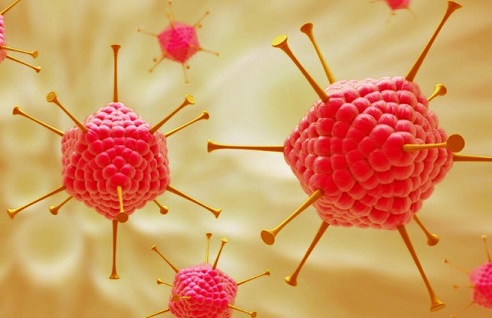ALCAM Identified as a Key Entry Factor in Severe Pneumonia Caused by Human Adenovirus B
Nikhil Prasad Fact checked by:Thailand Medical News Team Jan 02, 2025 3 months, 1 week, 6 days, 20 hours, 2 minutes ago
Medical News: Severe community-acquired pneumonia (SCAP) caused by human adenovirus species B (HAdV-B) represents a growing health concern. Although adenoviruses usually cause mild respiratory infections, HAdV-B has emerged as a key pathogen linked to serious pneumonia cases affecting both children and adults. Researchers from Shanghai Jiao Tong University School of Medicine, ShanghaiTech University, and Guangzhou Medical University recently unveiled pivotal insights into the role of activated leukocyte cell adhesion molecule (ALCAM) in facilitating HAdV-B infections.
 ALCAM Identified as a Key Entry Factor in Severe Pneumonia Caused by Human Adenovirus B
ALCAM Identified as a Key Entry Factor in Severe Pneumonia Caused by Human Adenovirus B
This
Medical News report delves into their findings, revealing how ALCAM functions as an essential entry factor for HAdV-B and its broader implications for treating adenovirus-related diseases.
The Significance of ALCAM in Viral Infections
Adenoviruses are small DNA viruses capable of infecting multiple tissues and causing a range of illnesses, from respiratory infections to conjunctivitis. Among the seven adenovirus species, species B is most associated with severe pneumonia. Previous studies have identified receptors like desmoglein-2 (DSG-2) and CD46 as factors in viral attachment. However, these receptors alone cannot fully explain the virus's ability to infect human cells, leading scientists to search for additional host factors.
Using advanced CRISPR technology, the research team screened over 5,600 cell surface proteins. This innovative approach highlighted ALCAM as a crucial player. Unlike DSG-2, which primarily aids viral attachment, ALCAM was found to facilitate internalization - the process by which the virus penetrates human cells to establish infection.
Core Findings from the Study
The study uncovered several critical aspects of the interplay between ALCAM and HAdV-B:
-ALCAM Expression is Elevated in SCAP Patients: Transcriptomic data revealed that SCAP patients infected with HAdV-B exhibit higher ALCAM levels compared to those with other infections, suggesting its key role in disease severity.
-ALCAM is Integral to Viral Internalization: Experimental results showed that cells lacking ALCAM were far less susceptible to HAdV-B infection, highlighting its critical role in the viral lifecycle.
-ALCAM Supports Infection Across Multiple HAdV-B Strains: The team demonstrated that ALCAM is a host factor used by both B1 and B2 genetic clusters of HAdV-B, including clinical strains such as HAdV-3, HAdV-7, HAdV-11, and HAdV-14.
-Strong Molecular Interactions with the Virus: Using techniques like surface plasmon resonance, researchers quantified the high binding affinity between ALCAM and the knob domain of the viral fiber protein. This interaction underscores ALCAM's role as an indispensable component of the infection process.
&
nbsp;
Implications for Treatment and Prevention
The discovery of ALCAM opens up new therapeutic possibilities for combating HAdV-B infections. Targeting ALCAM or disrupting its interaction with the virus could prevent viral entry into human cells. For instance, laboratory experiments showed that recombinant ALCAM protein successfully inhibited HAdV-B infections, paving the way for similar clinical interventions.
This multi-receptor infection model, where ALCAM, DSG-2, and other factors collaborate, offers a deeper understanding of adenovirus biology. It explains why HAdV-B is particularly efficient at infecting diverse cell types and causing severe disease. Future antiviral strategies could leverage these findings to block multiple entry pathways simultaneously.
Broader Relevance of ALCAM Research
Beyond adenoviruses, ALCAM has roles in immune cell migration, tissue regeneration, and inflammation. Its involvement in viral internalization adds another layer to its biological significance. This study also underscores the utility of CRISPR-based approaches in identifying key host-pathogen interactions and advancing biomedical research.
Concluding Thoughts
This landmark study significantly advances the understanding of severe adenovirus-related pneumonia. By pinpointing ALCAM as a major entry factor, researchers have provided new avenues for treatment and prevention. These findings offer hope for reducing the burden of pneumonia and related illnesses worldwide.
The study findings were published in the peer-reviewed journal: Nature Communications.
https://link.springer.com/article/10.1038/s41467-024-55261-3
For the more on Severe Pneumonia Caused by Human Adenovirus B, keep on logging to Thailand
Medical News.
Read Also:
https://www.thailandmedical.news/news/singaporean-researchers-discover-4-new-strains-of-adenovirus
https://www.thailandmedical.news/news/university-of-north-carolina-discovers-that-adenovirus-infections-can-cause-thrombocytopenia-could-new-strains-of-adenovirus-be-at-play
https://www.thailandmedical.news/news/researchers-warn-about-immune-issues-associated-with-adenovirus-based-vaccines-or-therapeutics
